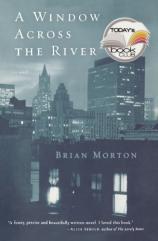Reading Group Guide
Discussion Questions
A Window Across the River

1. Who's telling the story in A Window Across the River? Comment on the novel's narrator(s), its defining perspective(s), or main point(s) of view. How, if at all, do they echo or enhance the narrative as a whole?
2. In chapter 6, Isaac wonders: "When had men become women and women become men?" Do you agree with his take on the confusion of modern-day masculine and feminine identities? What other views does author Brian Morton offer throughout the book on the sexes and their distinctions--that is, on how men and women distinctly see and shape the world today?
3. Discuss the theme of responsibility in this novel. What forms and qualities does responsibility assume? And how, over the course of the book, is this key concept defined and/or understood by Nora, Isaac, Billie, and Renee? And what about the related theme of trust?
4. One of the primary things Nora and Isaac have in common is that they're both artists. How do these two characters think about art, work, and the nature of creativity? Are their notions and experiences of the artist's life fundamentally similar or different? Explain.
5. Examine the novel as a satire of intellectual pretentiousness, aesthetic phoniness, professional solipsism, and the like--looking especially at Benjamin and Nadine and at the insulated worlds that they respectively inhabit.
6. Discuss the book's title. If it is a metaphor, what might it mean, stand for, or suggest? Also, address the recurrent presence of dreams and memories throughout A Window Across the River. To what extent are these characters governed by their inner voices, private reveries, or interior selves? And, along the same lines, what sort of tone does this novel exhibit--realistic, instructive, magical, symbolic, or otherwise?
7. Explore how A Window Across the River deals with the idea of futility--in art, work, life, relationships, etc. In particular, how does Isaac ultimately come to understand the pointlessness surrounding us?
8. "Them lady poets must not marry, pal." Why is this quotation from the poetry of John Berryman so important to the novel? Who and what does it refer to here, both specifically and generally?
9. Reflecting on the journey made by Nora across the full arc of Morton's narrative, what conflicts exist between being an artist and caring for others? For example, why does she keep working on the "Gabriel" story when she knows it will eventually and certainly hurt Isaac? And how, if at all, does the novel depict such conflicts as surmountable?
10. At the end of chapter 43, Nora is confronted by a "hip-looking" young pediatric nurse who asks her, "Who's your child?" Nora responds perplexingly: "You are." What does she mean by this remark?
11. Describe the novel's ending. The scene that finishes chapter 44--and the book itself--basically ends in media res. How do you think the rest of this scene plays out? Why? And what about the rest of the story of Nora and Isaac?
12. Consider setting in A Window Across the River. What role does New York City play in these proceedings? Moreover, discuss the novel as a New York love story, comparing and contrasting it with other novels, stories, and movies you've encountered within this ever-popular category.
A Window Across the River
- Publication Date: September 7, 2004
- Paperback: 300 pages
- Publisher: Mariner Books
- ISBN-10: 0156030128
- ISBN-13: 9780156030120







